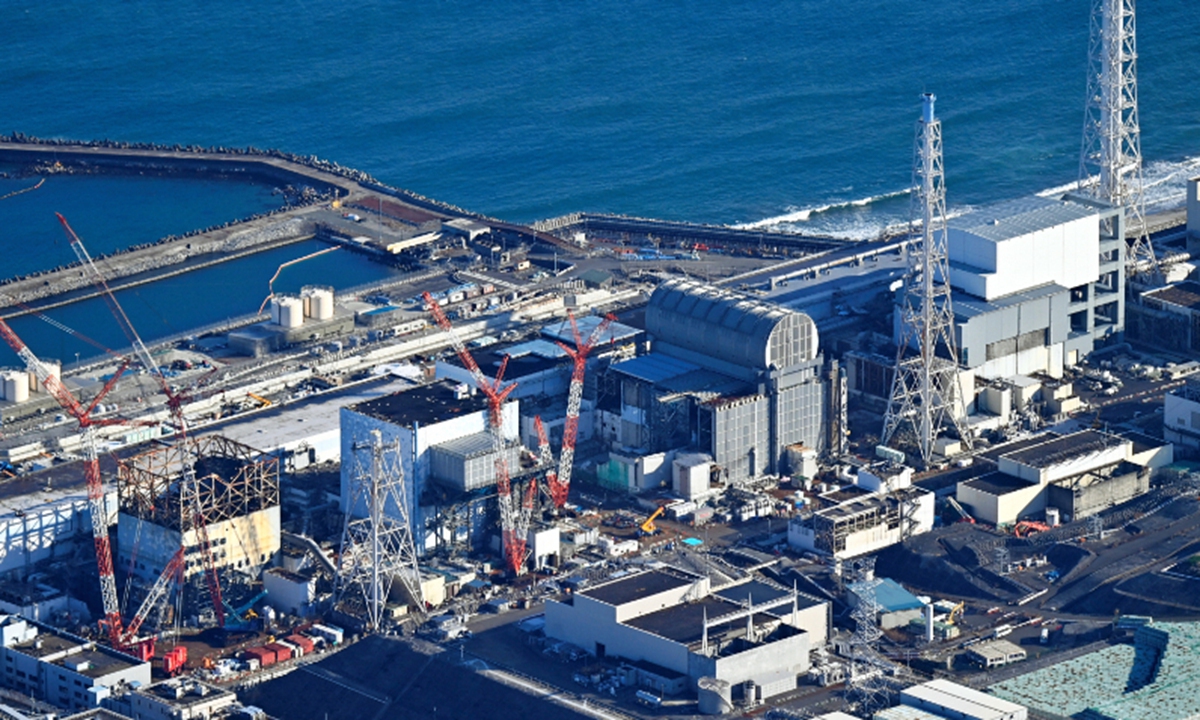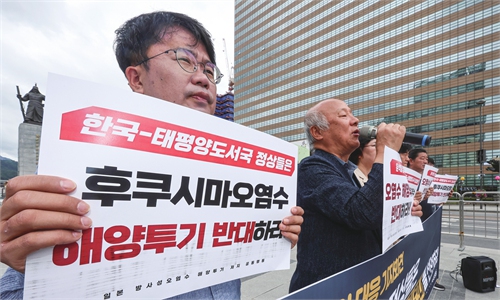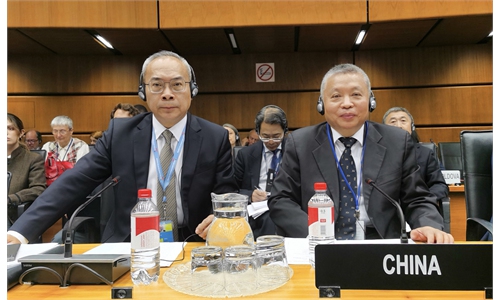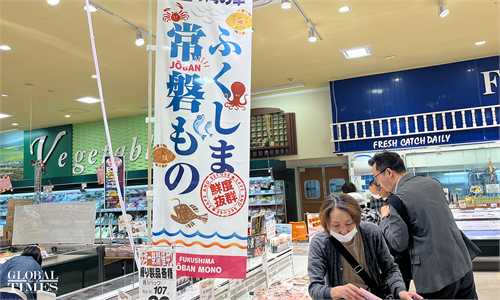Japan trials radioactive water dumping facilities amid protests
Move may threaten S.Korean culinary culture: NGO rally

Aerial photo shows the damaged reactors at Fukushima Daiichi nuclear power plant on January 19, 2023, in Fukushima, Japan. Photo: VCG
Fierce opposition from home and abroad flooded Japan as the operator of the crippled Fukushima Daiichi nuclear power plant has officially begun trialing its equipment on Monday to dump nuclear-contaminated water into the Pacific Ocean, according to multiple media reports.
Criticism and protests came from neighboring nations including China and South Korea, and local communities are concerned that potential radioactive pollution would harm local environments and damage the food systems, with many calling for a boycott of sea products from Japan.
The Chinese Foreign Ministry reiterated its opposition on Monday over Japan's unilateral decision. Japan should not let the whole world bear the cost of pollution and damage the whole ocean for its own interests, which is extremely selfish and irresponsible, said spokesperson Wang Wenbin.
Japan's selfish practice will not convince its people or people abroad, but will only bring shame to the country, victimize the people of neighboring countries and Pacific Island countries, and further discredit Japan among the international community, said Wang.
Tokyo Electric Power Co (TEPCO) began the test run on Monday, using fresh water, Japanese media outlet NHK reported. The utility plans to spend about two weeks checking if the system's pumps are functioning properly and whether water flows can be shut down if an extraordinary event occurs.
TEPCO said that it hopes to finish the test run this month, including a period for an inspection by the Nuclear Regulation Authority.
Japan's fishing officials said that they remained opposed to the plan when they met Industry Minister Yasutoshi Nishimura on Saturday as he visited Fukushima and the neighboring prefectures of Ibaraki and Miyagi, AP reported.
"We stand by our opposition," Tetsu Nozaki, head of the Fukushima Prefectural Federation of Fisheries Cooperative, told Nishimura. Nozaki, however, said the association supports progress in the plant's decommissioning and hopes to continue the dialogue.
On Chinese social media networks, many netizens called for restrictions on imports from Fukushima. Some worried that goods from regions beyond Fukushima in Japan also have potential nuclear radiation contamination risks, same goes on products beyond seafood.
"There should be practical measures in China to ban certain food imports from Japan, considering the potential danger," wrote one netizen on China's Twitter-like platform Sina Weibo.
"I have many bottles of makeup made in Japan," wrote another netizen. "I probably won't throw out my stock, but will definitely not buy any more of them."
The marine food professional committee of the China Food Industry Association has not yet received a decision from China Customs or the State Administration of Market Regulation on whether to react through import bans on related seafood, and it is currently awaiting a decision, Yang Guiqing, an official of the committee, told the Global Times on Monday, noting that an expert study could be organized over the issue.
In another neighboring country of Japan, a South Korean nongovernmental organization - the Korea Federation of Environmental Movement (KFEM) - started another rally against Japan's latest move on Monday afternoon in Seoul.
"We South Korean people are concerned that we cannot enjoy seafood any longer due to potential radioactive pollution, and we fear that we cannot keep our traditional culinary culture," Denise Yoon, a member of the KFEM, told the Global Times.
Yoon pointed out that nuclear physicists said that TEPCO's technology is not sufficient to treat radioactive materials including cesium as well as tritium, which will lead to pollution of sea products.
According to a KFEM's poll in May, 72 percent of the respondents said they would reduce consumption of seafood after the Fukushima nuclear-contaminated water was released into the ocean. The marine tourism industry will also be affected negatively due to the public fear of exposure to tritium.
Yoon said that the organization is considering several ways to reverse Japan's decision, including calling for international political pressure in the short term and legal pressure in the long term.
Hideyuki Ban, a Japanese nuclear expert and co-director of the Citizens' Nuclear Information Center, voiced his support for the protests.
"The discharge of the nuclear-contaminated water into the ocean will have a huge impact on the entire human race," he said. "We hope to unite with all parties to somehow make the Japanese government revoke its decision over the project."
Analysts and observers urged the international community to pay more attention and put pressure on the Japanese plan, which could kick off in the near future, in order to stop this highly harmful program or at least reduce its negative impact.
A decision from the International Atomic Energy Agency is expected as early as the end of June, which will determine whether Japan can officially start the widely controversial project to dump nuclear-contaminated water into the ocean.



